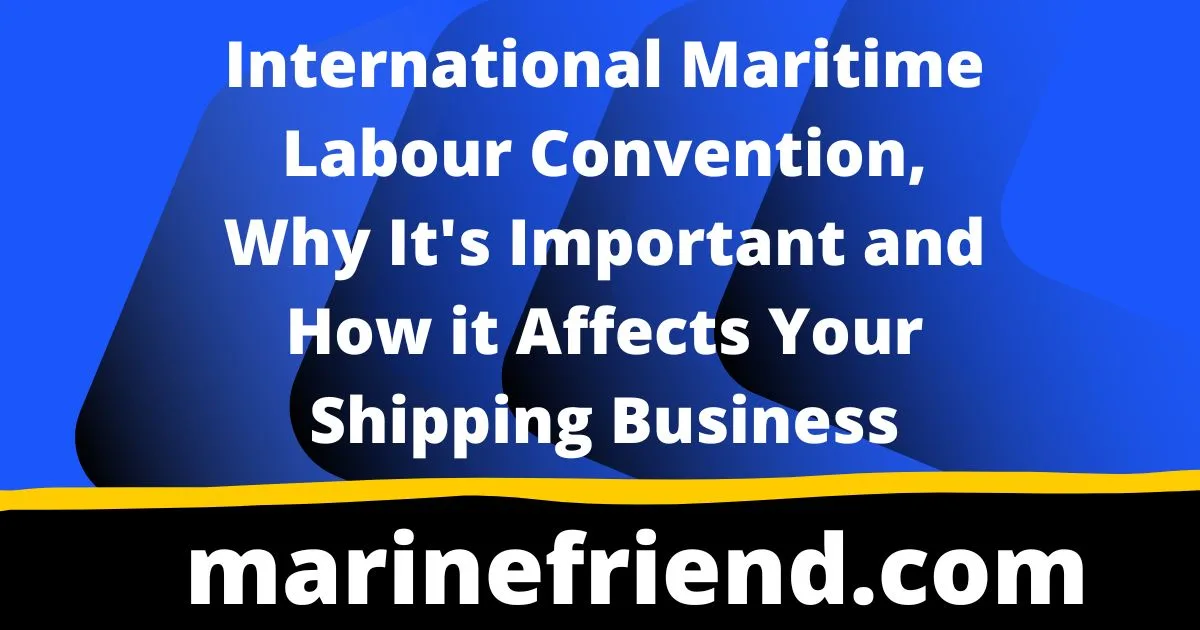MARINE FACTS
International Maritime Labour Convention, Why It’s Important and How it Affects Your Shipping Business

Introduction to the International Maritime Labour Convention, What it is and why it Matters
The International Maritime Labour Convention
In 2006, the International Maritime Organization (IMO) adopted a new Maritime Labour Convention to regulate the conditions of employment for seafarers. The convention was developed by the IMO’s Inter-Governmental Maritime Consultative Organization in order to improve living and working conditions at sea with a focus on health and safety, human rights and labour standards.
(ILMC), 2006 (No. 187) is a UN convention which sets out the minimum standards for all workers in the international maritime industry, in particular with regard to working hours, rest periods, pay and discharge. It was adopted on 10 November 2006 and entered into force on 18 February 2007. The ILMC is one of the few conventions that have been ratified by all five permanent members of the United Nations Security Council; it has also been ratified by more than 140 countries across six continents. This makes it an important international instrument that ensures fair working conditions for seafarers around the world. .The ILMC sets out minimum standards for on-board crews and shore-based workers. The Convention covers a range of topics, including: The ILMC will be replaced by the new International Convention for Safe Navigation of War Engines,
The International Maritime Commission is set to be replaced by the new International Convention for Safe Navigation of War Engines. The new convention, which will be the first of its kind, will focus entirely on how war engines can safely navigate the sea without endangering other ships.
which extends to all vessels and provides a more comprehensive coverage.
Update 1: Scope of the Protocol to MLC amendement – I. The Protocol is applied to future international ships trading in the High Risk Area and II. Maritime Security and Safety · Update 2: Digest Model Labour Laws for Caribbean Countries
The Protocol is applied to future international ships trading in the H. The amendment is not retroactive and does not apply to vessels that are already trading internationally.
This article will discuss the scope of the Protocol to MLC amendment. The Protocol is applied to future international ships trading in the H. The amendment is not retroactive and does not apply to vessels that are already trading internationally.
Memorandum 6, 1744 – Amllment of an international maritime labour convention, 2006 (MLC) regarding armed or defence-yacht personnel working on such vessels (2C1)
In 2006, the International Maritime Labour Convention (MLC) was amended to include a new provision for armed or defence-yacht personnel. The MLC is an international agreement that provides minimum standards of employment and working conditions for seafarers.
The MLC was amended to include a new provision for armed or defence-yacht personnel. The amendment states that such vessels are exempt from the provisions of the MLC relating to hours of work, rest periods, overtime and annual leave if they meet the following criteria:
1) They do not carry any cargo; or
2) They carry only goods that are not destined for sale in any port in which they call;
3) They are under military command; and
4) They fly the flag of one
-

 SEAFARERS3 years ago
SEAFARERS3 years agoBsid dg shipping email id and contacts
-

 RPSL3 years ago
RPSL3 years agoBlacklisted RPSL companies 2021/2022/PART-2
-

 SEAFARERS3 years ago
SEAFARERS3 years agocommerce se merchant navy kar sakta hai kya?
-

 RPSL3 years ago
RPSL3 years agoBlacklisted RPSL companies 2021/2022/PART-1
-

 RPSL3 years ago
RPSL3 years agodg shipping approved company
-

 RPSL3 years ago
RPSL3 years agorpsl shipping company list in Belapur
-

 DG SHIPPING3 years ago
DG SHIPPING3 years agodg shipping approved doctors list 2021-2022
-

 COLLEGES3 years ago
COLLEGES3 years agodns sponsorship companies in india
